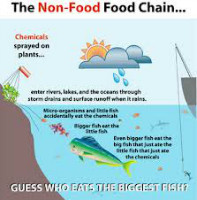Are you an advocate for organic food over conventional
farming practices?
I never quite know what I’m going to blog about right up to
the point where I am sitting at my laptop, but this is a topic that springs to
mind and is relevant to food, food choices and kitchens so here’s my spin on
it.
When I was a kid growing up in England pretty much
everything grown was organic and the word “organic” was never heard. Of course whatever
circumstances you’re born into are the norm for you at that time and as a child
your awareness is limited to your family and immediate surrounding environment.
I was fortunate enough to grow up in a countryside setting
of fields and hedgerows, trees and woodlands. Adjacent to our house was a five
acre field that my parents allowed a neighboring farmer to grow crops on. I
used to come home from school to find Mr. Drumond plowing and I would get to
climb on the back of the tractor and go up and down the field watching as the
fresh furrows drew all kinds of birds to feed on worms and insects in the soil.
At the back of the house was a small paddock and in spring
it would become a magical land of wild flowers, grasses and bracken ferns. They
would grow to a height where my siblings and I were just tall enough to have
our heads at flower level. There were Milk Maids and Cow Slips, Buttercups.
Primroses, corn flowers, poppies, daisies and a myriad others who’s names I’ve
long forgotten, but to us it was a sea of color and wonder.
Like most people I wasn’t aware of the change in farming
practices. I couldn’t say when the use of artificial fertilizers and pesticides
began to appear. My father always liked to have his own vegetable garden and
grew most of our produce, so it wasn’t until leaving home and buying groceries
in a local supermarket that I started to realize that store bought fruits and
veggies didn’t taste as good.
Over the years, with the huge growth in populations around
the world, the demand for more affordable food has pressed farmers and science,
to come up with ever more ingenious ways to generate bigger harvests as
economically as possible. A scenario that has brought about a system where ever
more fertilizers and pesticides are required to grow food crops with depleting
nutritional value and a general impoverishment of the soil.
One of the scientific developments achieved in recent years,
brought about by among other things, the need to reduce the use of chemical
pesticides, was the introduction of genetically modified (GMO) foods. Genetic
modification is intended to provide plants with resistance to biological attack
from both insects and various climatic conditions thereby making crop failure a
less likely outcome.
What the ramifications of all our biological “tinkering” will
have on our health is unclear and the jury is still out on that one. Without
doubt most of us have already consumed a good deal of genetically modified food
without knowing it and as far as we are aware, no ill effects. However, what
the long term consequence will be is a question that has many people concerned
enough to avoid GMO products at all costs. Is this attitude justified? Perhaps,
but we cannot view the question in isolation. After all, what effect does
biological manipulation have on the ecco-system. Aside from better harvests and
more resilient crops, what are the implications for other plants, animals,
birds and insects that depend on a balanced ecco-system for their survival?
Making one particular species stronger and hardier than another perhaps makes
for a weakness somewhere else.
I tend to think of science as a tool which in the right
hands can bring great benefit to humanity, but that must obviously include all
life forms including those we depend on. It’s a delicate balancing act messing
with ecology. No one can see the ‘big picture’ with any degree of clarity, only
our individual interpretations of it. Whether they be politicians, scientists,
theologians, or philosophers, our views are subject to error and therefore it
pays to tread cautiously when introducing technology that can have long term
consequences.
All this leads back to the original question, are you an
advocate for organic food over conventional farming practices? To my way of
thinking we have strayed off course in our need to accommodate the ever
increasing demand for food. I do not believe that the continued use of chemical
fertilizers and pesticides is the best method of providing healthy and
nutritious produce. I do believe that a return to sustainable horticultural
practices would mean a gradual increase in organic farming and a healthier
environment.














No comments:
Post a Comment